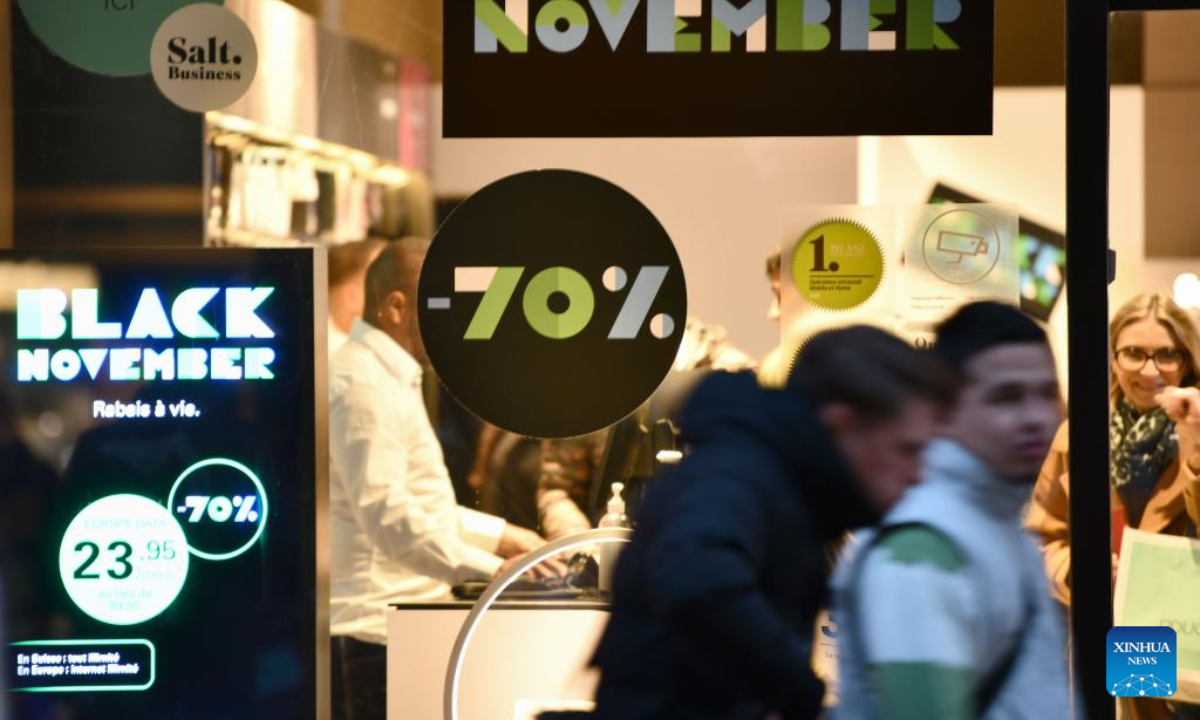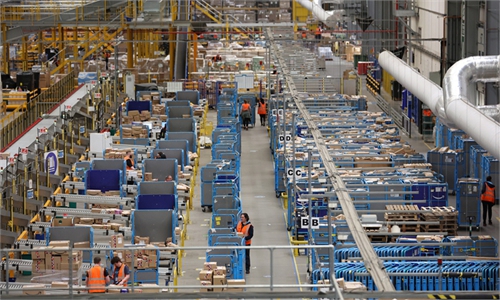China-made products inject vigor into Black Friday; though surging inflation set to curtail consumption

A sales promotion sign is seen during Black Friday sales at a shop in Geneva, Switzerland, Nov 25, 2022. Photo:Xinhua
From projectors to highly popular leggings, made-in-China products injected vigor into Black Friday, a traditional shopping bonanza in the West that kicked off on November 25, proving China's contributions to stabilizing global supply chains.
Despite retailers' stepped-up promotions and pledged deeper discounts, high inflation and global economic slowdown will continue to weigh on consumer spending and the livelihoods of ordinary people in the US and Europe, experts said.
US consumers spent a record of $9.12 billion online during this year's Black Friday, compared with $8.92 billion spent last year, data from Adobe Analytics, which tracked 80 of the top 100 US retailers, showed on Saturday. The company attributed the rise of online spending to steep price discounts from smartphones to toys.
China's cross-border e-commerce companies geared up for Black Friday. Wang Minchao, a staff member from AliExpress, the cross-border e-commerce platform of Alibaba, told the Global Times that European and American consumers prefer Chinese goods during the shopping carnival due to their cost-effectiveness.
Wang said that the platform provided three major types of products for US and European consumers — projectors and TVs to watch the World Cup matches, warming products to meet European winter needs, and Christmas trees, lights, ice machines and holiday decorations for upcoming Christmas.
Liu Pingjuan, general manager at a kitchenware company in Yiwu, East China's Zhejiang Province, told the Global Times that consumers from the US reserved goods for this year's Black Friday. The company mainly exports stainless steel tableware and silicone kitchenware to the US.
"The company has been shipping to the US since August, and all the products purchased by customers have arrived on the shelves of local supermarkets," Liu said, noting that the variety of products is richer than before, despite a decrease in product purchases.
Hu Qimu, deputy secretary general of the digital-real economies integration forum 50, told the Global Times that high inflation in Europe and the US curbed purchasing power, and Chinese cost-effective goods with stable supplies became more competitive in overseas markets.
Hu noted that the rising cost of living has curtailed consumer spending, so European and American shoppers will adjust their spending. They will likely spend their limited budgets on daily necessities, which will bring considerable market opportunities for Chinese cross-border e-commerce dealers.
Although steep discounts spurred spending during the Black Friday, high inflation and rising interest rates will continue to drag down consumption during the month-long holiday shopping season.
Overall spending this holiday season will probably grow 2.5 percent from a year earlier, compared with 8.6 percent last year and a whopping 32 percent growth in 2020, according to data from Adobe Inc, Los Angeles Times reported.
As those figures aren't adjusted for inflation, they could be the result of price increases, rather than an increased number of goods sold, according to the report.
According to Reuters, US business activity contracted for a fifth straight month in November, with the US Composite PMI Output Index falling to 46.3 in November from 48.2 in October.
"As the purchasing power of American households declines, to cope with the balance of payments and a possible economic recession in the US, the 2022 year-end shopping season is unlikely to repeat the spree seen in previous years," Wang Xin, president of the Shenzhen Cross-Border E-Commerce Association, told the Global Times.
The layoffs in Silicon Valley technology companies are gradually expanding from the technology industry to other areas such as finance, media and entertainment, caused by high inflation, which is bound to squeeze more Americans' pocketbooks and restricting their purchase power, Wang added.
Many Western countries face the same situation. UK inflation jumped to a 41-year high of 11.1 percent in October, Reuters reported.
"A complex of factors including the Russia-Ukraine conflict and disruption in global supply chains led to elevated inflation. As incomes shrink due to difficulties across the whole economic cycle, European consumers are cutting their spending," Gao Lingyun, an expert at the Chinese Academy of Social Sciences in Beijing, told the Global Times on Saturday.



